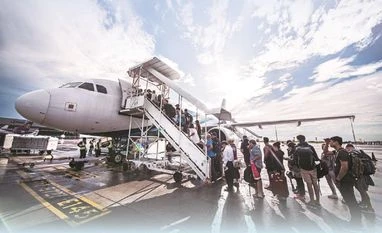The government has revised the Aircraft (Security) Rules, 2023, under which a person making hoax bomb threats can be fined up to Rs 1 crore.
The Ministry of Civil Aviation issued a gazette notification adding Section 30A to the Aircraft (Security) Rules, 2023. This section penalises the act of sharing false information that could “jeopardise the safety and security of an aircraft, aerodrome or civil aviation facility or both; (b) cause panic among passengers, crew and ground personnel or the general public; or (c) disrupt the civil aviation operation.”
Additionally, Rule 29A has been introduced, empowering the director general to issue written directives to deny boarding to individuals or groups or to remove them from the aircraft.
Violations under these provisions carry penalties ranging from Rs 1 lakh to Rs 1 crore, based on whether the offender is an individual or a larger organisation with up to 300 employees.
According to government data, a total of 1,143 hoax bomb threats were reported by domestic airlines between August 2022 and November 13, 2024, with a significant spike in cases this year. The civil aviation ministry said in Parliament last month that 994 of these threats occurred in 2024 alone.
In connection with the October surge of hoax calls, authorities have detained two suspects: a 35-year-old resident of Gondia, Maharashtra, named Jagdish Shriam Uikey, and a 17-year-old from Rajnandgaon, Chhattisgarh.
Officials noted that the Bharatiya Vayuyan Vidheyak Act, 2024, which replaced the Aircraft Act of 1934, does not classify most offences as cognisable, limiting FIR registrations without court approval and restricting jail terms to less than two years. To address this, the Ministry of Civil Aviation is considering amending the Suppression of Unlawful Acts against Safety of Civil Aviation Act (SUASCA), 1982, which recognises cognisable offences.
More From This Section
Protocol for handling bomb threats
The Centre revised its approach to handling bomb threats after identifying a pattern of anonymous social media accounts issuing threats that were subsequently deleted.
Previously, any message or call mentioning a flight number was treated as a specific threat, in line with the Bureau of Civil Aviation Security (BCAS) protocol. Under this procedure, an aircraft receiving a threat was required to land at the nearest airport for inspection.
The updated guidelines now allow flights to continue to their destination if a threat from a particular account has already been verified as a hoax. This change aims to reduce diversions, which often result in financial losses and inconvenience for passengers. In cases where a threat is deemed credible, air traffic control notifies the airport, which then activates resources such as fire brigades, bomb disposal units, sniffer dogs, and, if necessary, emergency evacuation systems.
(With agency inputs)
)